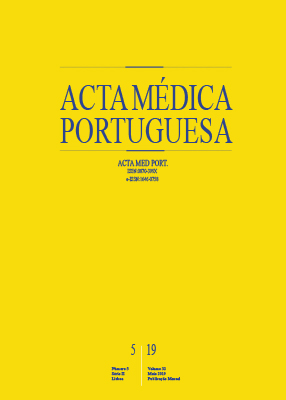Initial Therapeutic Choices for Type 2 Diabetes in the Portuguese Sentinel Practice Network
DOI:
https://doi.org/10.20344/amp.10414Keywords:
Diabetes Mellitus, Type 2/drug therapy, Hypoglycemic Agents, Portugal, Primary Health Care, Sentinel SurveillanceAbstract
Introduction: Type 2 diabetes is a major driver of pharmaceutical spending. We aimed to determine the proportion of new patients who begin treatment with each antidiabetic medicine class, if therapy was initiated by their family physician, if family physicians alter prescriptions initiated by other physicians, and to compare prescribing patterns of family physicians and other specialists.
Material and Methods: Cohort-nested cross-sectional study within the Portuguese Sentinel Practice Network. Between 2014 and 2015, incident cases of type 2 diabetes were notified, thus reporting treatment, who made the initial prescription and if treatments initiated by other physicians were changed.
Results: A total of 415 incident cases were notified. The initial prescription was made by Sentinel Practice Network physicians in 89.4% of cases (95% CI 86.0% - 92.0%). Metformin was most often chosen as the first treatment, prescribed to 85.5% of patients (95% CI 81.8% – 88.6%). Family physicians used less dipeptidyl peptidase-4 inhibitors (4.2% vs 30.3%, p < 0.001) and insulin (0.3% vs 12.1%, p < 0.001) compared to other specialists. Prescriptions initiated by others were changed in 4.5% of cases (95% CI 0.4% - 16.0%).
Discussion: Prospective data collection is a major study strength, but few cases of treatment initiated by non-family physicians were notified. Data for disease severity was unavailable and could partly explain differences between family physicians and other specialists.
Conclusion: Metformin was most often chosen as initial therapy, in line with Portuguese guideline recommendations. Sentinel Practice Network physicians diagnosed most cases, seldom changed prescriptions initiated by others, and had a different pattern of antidiabetic medicines use compared to other specialists.
Downloads
Downloads
Published
How to Cite
Issue
Section
License
All the articles published in the AMP are open access and comply with the requirements of funding agencies or academic institutions. The AMP is governed by the terms of the Creative Commons ‘Attribution – Non-Commercial Use - (CC-BY-NC)’ license, regarding the use by third parties.
It is the author’s responsibility to obtain approval for the reproduction of figures, tables, etc. from other publications.
Upon acceptance of an article for publication, the authors will be asked to complete the ICMJE “Copyright Liability and Copyright Sharing Statement “(http://www.actamedicaportuguesa.com/info/AMP-NormasPublicacao.pdf) and the “Declaration of Potential Conflicts of Interest” (http:// www.icmje.org/conflicts-of-interest). An e-mail will be sent to the corresponding author to acknowledge receipt of the manuscript.
After publication, the authors are authorised to make their articles available in repositories of their institutions of origin, as long as they always mention where they were published and according to the Creative Commons license.









